Upper Body Thermography
Upper Body Thermography
Focused Imaging for Upper Body Wellness
Upper body thermography provides a detailed view of your body's surface temperature patterns in key regions, offering insight into circulation, vascular activity, inflammation and functional changes. This safe contact-free technology captures 19 images from the head to pelvic region, creating a thermal map that can highlight important physiological patterns.
With expert interpretation, thermography can help identify areas of imbalance early, supporting you and your healthcare team in making informed choices about your health.

What an Upper Body Scan Covers
An upper body scan includes imaging of the head, neck, thyroid, chest, breasts, abdomen, and back, including a testicular screening for men. Thermography can help assess:
- Breast health
- Thyroid function
- Oral inflammation
- Lymphatic system function
- Inflammatory conditions
- Neuromuscular conditions
Thermography does not diagnose conditions directly, but it highlights patterns that may warrant further evaluation or proactive care.
Why Choose Upper Body Thermography?
- Safe and non-invasive - no radiation, no compression, no contact
- Early insights - detect changes circulation and inflammation before symptoms may appear
- Focused upper body perspective - assess key systems affecting overall health overall wellness
- Empowering for proactive health - monitor changes over time time as part of a personalized wellness plan
Screening Details
- Includes 19 images of the head, neck, thyroid, chest, breasts, abdomen, and back, including a testicular screening for men
- Performed in a comfortable, private setting
- Interpreted by a three levels of review by board certified thermologists
Deep Vein Thrombosis
Deep vein thrombosis (DVT) occurs when a blood clot forms in one or more of the deep veins in the body, usually occurring in the legs. DVT can cause leg pain or swelling but also can occur with no symptoms. DVT can be very serious, if undetected, blood clots in the veins can break loose, travel through the bloodstream and lodge in the lungs, blocking blood flow (pulmonary embolism).
Early detection of DVT is critical to prevent a pulmonary embolism. However, most conventional methods for diagnosing DVT are functionally limited and complicated.
Thermography is an effective screening tool for DVT due to its convenience, rapid response, and high sensitivity.
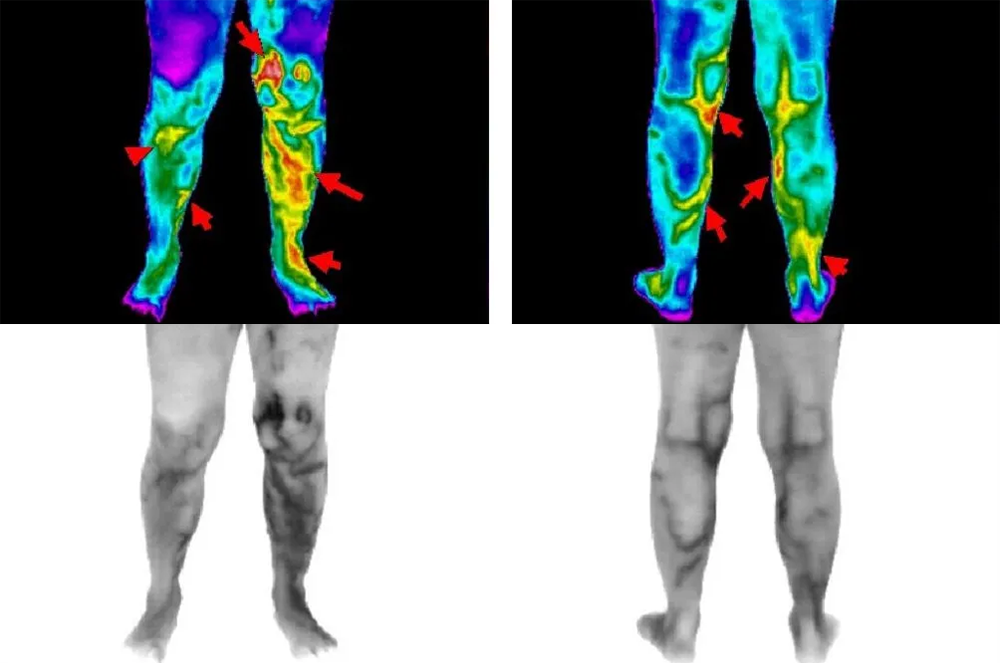
DVT Viewed in Left Leg Indicated by Increased Varicosities
Gout
Gout is a common and complex form of arthritis, caused by inflammation. It is characterized by sudden, severe attacks of pain, swelling, redness and tenderness in the joints, often found in the joint at the base of the big toe.
Measurement of skin temperature is utilized to assess localized or regional inflammation. Thermography has been found to be a valuable aid, being both precise and accurate.
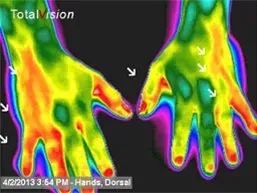
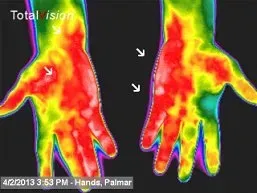
Gout in Hands
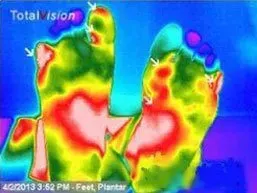
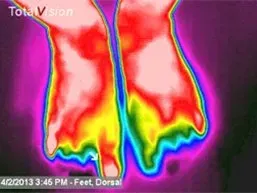
Gout in Feet
Thoracic Outlet Syndrome
Thoracic outlet syndrome (TOS) is a condition whereby symptoms are produced from compression of nerves or blood vessels, or both, because of an inadequate passageway through an area between the base of the neck and the upper chest area known as the thoracic outlet. This compression can cause pain in the shoulders, neck, arms or hands. The impaired circulation to the extremities causes discoloration, numbness and tingling in the fingers.
Common causes of TOS include repetitive injuries such as sports-related activities, physical trauma or certain structural abnormalities.
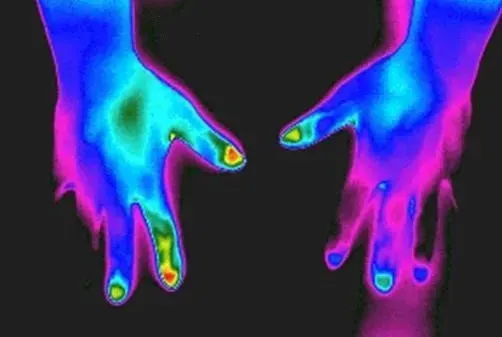
Thoracic Outlet Syndrome Seen as Missing Fingers
Take the Next Step
Focus on Your Upper Body Health
An upper body thermography screening provides a safe, detailed view of key regions of your physiology. At CT Thermography we're here to help you make proactive, informed choices for your ongoing wellness.
Upper Body Thermography Screening - $450
This screening included 19 images covering the head, neck, thyroid, chest, breasts, abdomen, and back, with a testicular screening for men.



